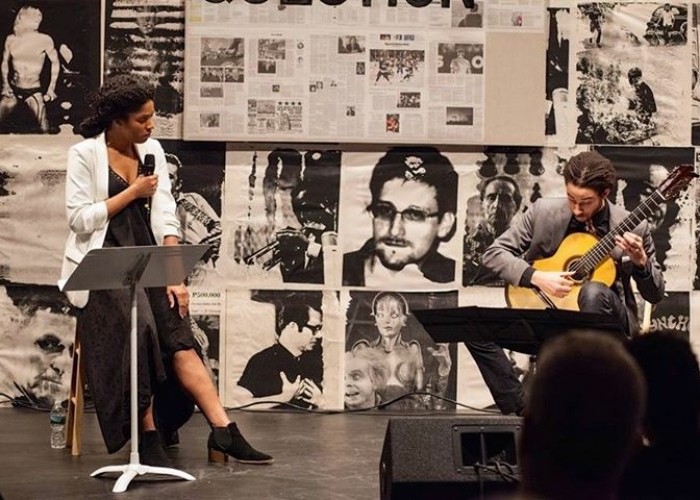Jan 13, 2026 2:09 PM
More Trump-Kennedy Center Cancellations
The fallout from the renaming of the John F. Kennedy Center for the Performing Arts to include President Donald…

Alicia Hall Moran and Thomas Flippin perform at Gavin Brown’s enterprise in New York.
(Photo: Ed Marshall)Your collaborators on this album, like with guitarist Thomas Flippin and the band Harriet Tubman, are impressive. How did you connect with them?
I met Thomas in a church—his wife is a Methodist minister who fights for marriage equality. Petitioning the worldwide voice of Methodism; that’s her angle, welcoming anybody and everybody into her congregation. I find that ... him having a strong woman in his life ... gives him the sound I’m looking for in the guitar. I can’t tell you how or why. I just know that—same with Brandon Ross. I have worked with Brandon for years, but just he and I. He invited me to join him and his band, Harriet Tubman, as part of his residency at The Stone. We have a footing that is very sure that has yielded so many beautiful concerts around the country; it’s very special to me. So, when he invited me to go in with Tubman, it was like a glove.
At the same time, your husband doesn’t figure much on Here Today, unlike your previous album, Heavy Blue (Self Release), which he produced.
He’s not really present on the album. He plays a one-finger solo in one song and played and co-arranged “Feeling Good” with me. I play all the rest of my own piano; I composed everything. I kicked him out of the room when I was composing. I hid my notebook from him, because I didn’t want him to see something I wrote. He’s like a little computer, a truly talented mimic, also—he can hear it and play it back. I knew that if he even heard me play this music, he would absorb it into his music and play with the Bandwagon before I could even put it on my own record. So, he didn’t even hear these things as I made them.
Here Today opens with this mashup of Stevie Wonder and Georges Bizet. What inspired that?
I did a project in 2012 called “The Motown Project,” ... combinations of Motown songs with classical music and opera with operatic narratives, dramatic themes and turns. I would take all these little dramatic stereotypes and find their counterpart in Motown. I did a whole night of my vision for my voice, where all the soul I could put into my Mozart would be allowed and all of my German Romantic placements were allowed.
One of the more striking and personal songs on the new album is “Black Wall Street,” which is, in part, about your father, who did work on Wall Street for a time. What can you tell me about that tune?
My father is black and he was on Wall Street, so I knew I was gonna definitely make a performance called “Black Wall Street” for my dad. I did this at National Sawdust. It was seen and got redeveloped for the Schomburg Center and the River To River Festival. That night it was seen by someone [now] bringing it to Tulsa[, Oklahoma] where they had a neighborhood called Black Wall Street, a black millionaire’s row that was the victim of a savage racial attack.
Did you run up against friction as a black woman entering into the very white, Eurocentric world of classical music?
Absolutely. But what it’s also an illustration of is the personal politics of anyone attempting to be a true artist of any race. ... In terms of American history, we’re talking about life and death stakes; you’re talking about letting people thrive or wishing them to be wiped off the face of the Earth. And black people don’t own that on any side; look at human history. But we sure get a clear window into it, we get a front seat. What we hope is that the front seat teaches compassion. What I know [is that] it teaches deep intelligence in the body, in the heart and in the mind. I can see better than other people can see because of what I know. That’s why I’m so endlessly passionate about putting everything I know into the music. DB

Belá Fleck during an interview with Fredrika Whitfield on CNN.
Jan 13, 2026 2:09 PM
The fallout from the renaming of the John F. Kennedy Center for the Performing Arts to include President Donald…

Peplowski first came to prominence in legacy swing bands, including the final iteration of the Benny Goodman Orchestra, before beginning a solo career in the late 1980s.
Feb 3, 2026 12:10 AM
Ken Peplowski, a clarinetist and tenor saxophonist who straddled the worlds of traditional and modern jazz, died Feb. 2…

The success of Oregon’s first album, 1971’s Music Of Another Present Era, allowed Towner to establish a solo career.
Jan 19, 2026 5:02 PM
Ralph Towner, a guitarist and composer who blended multiple genres, including jazz — and throughout them all remained…

Rico’s Anti-Microbial Instrument Swab
Jan 19, 2026 2:48 PM
With this year’s NAMM Show right around the corner, we can look forward to plenty of new and innovative instruments…

Richie Beirach was particularly renowned for his approach to chromatic harmony, which he used to improvise reharmonizations of originals and standards.
Jan 27, 2026 11:19 AM
Richie Beirach, a pianist and composer who channeled a knowledge of modern classical music into his jazz practice,…